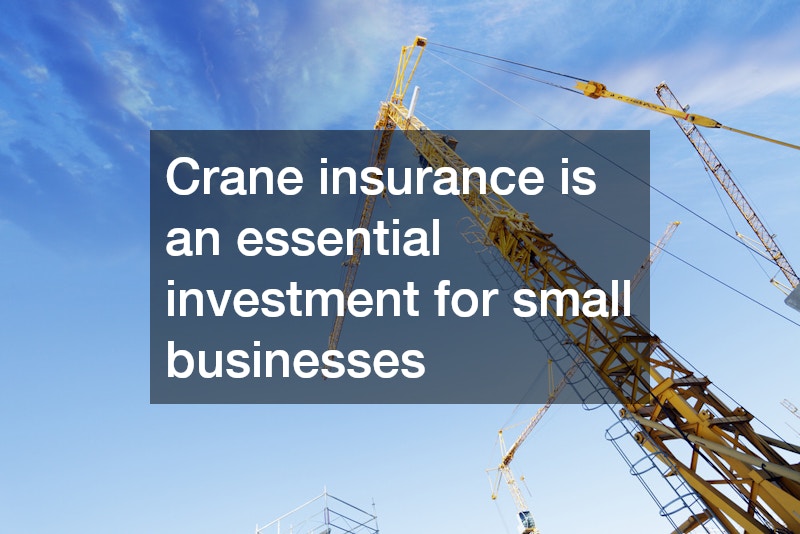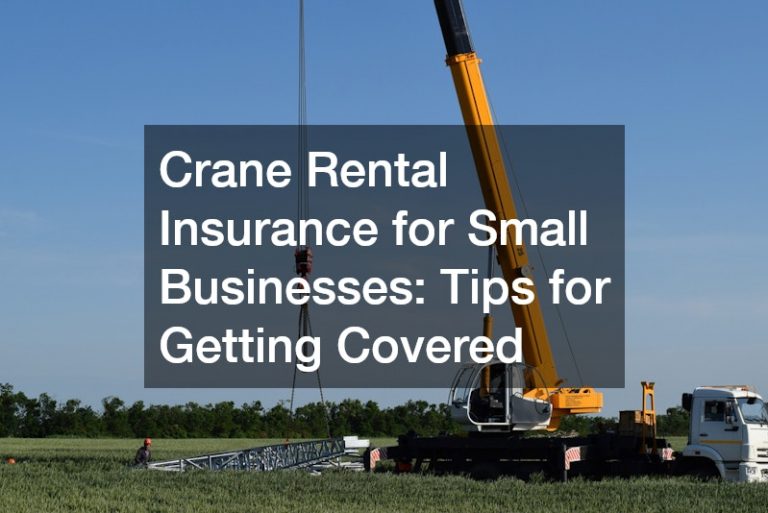Disclaimer: The insurance information provided here is for general knowledge only and does not replace advice from licensed insurance professionals. Please consult a qualified advisor for coverage decisions.
For small businesses engaged in construction or similar industries, crane rental insurance plays a pivotal role in protecting their financial well-being. It is essential for these enterprises to comprehend the distinct benefits of obtaining appropriate coverage, which range from safeguarding against unexpected liabilities to ensuring continuity in their operations. As we proceed, this article will explore the crucial aspects small business owners need to understand about crane insurance.
Why is Crane Rental Insurance Necessary for Small Businesses?
Crane rental insurance is not just a precautionary measure—it is a crucial safeguard for small businesses that are often operating on tight margins and limited resources. Without proper coverage, these enterprises are vulnerable to significant financial losses that could result from accidents or property damage involving cranes. Ensuring robust insurance coverage is integral to maintaining operational resilience and protecting the longevity of a business.
Crane insurance encompasses various types of coverage tailored to meet the unique needs of businesses that rent cranes for their projects. It typically includes general liability coverage that protects against claims of bodily injury and property damage caused by crane operations. Additionally, coverage may extend to include rental equipment protection, safeguarding the rented crane against physical damage or theft during the rental period.
The comprehensive nature of this insurance means it may also offer business interruption insurance, which compensates for lost income and continuing expenses if crane-related incidents halt operations. Such coverage is vital for ensuring business continuity in the face of disruptions. By understanding these coverage areas, small business owners can make informed decisions about the level of protection they need to secure their operations effectively.
How to Choose the Right Crane Rental Insurance Provider?
Selecting an appropriate insurance provider is as critical as obtaining the insurance itself, as it ensures the business receives reliable and timely support in moments of need. Business owners should conduct thorough research, seeking providers with a strong reputation, favorable client reviews, and a proven track record in handling claims efficiently. Ideally, a provider with industry-specific expertise can offer tailored insurance solutions that cater to the distinct requirements of crane operations.
Conducting a comparative analysis of leading crane insurance providers equips small business owners with valuable insights to make informed choices. Each provider offers distinct advantages in terms of coverage flexibility and customer service, making it imperative to assess their propositions meticulously. For example, Provider A might offer comprehensive liability packages at competitive rates, while Provider B could stand out for its exceptional claims processing efficiency and customer support.
Beyond individual provider strengths, it is beneficial to consider the long-term stability and financial strength of the insurer in question. Large and well-established insurers typically offer greater reliability and assurance of policy honorability, especially in complex claims scenarios. By examining the financial ratings and solvency ratios of potential insurance providers, businesses can ensure they select a partner capable of sustaining long-term collaboration and support.
What Factors Affect the Cost of Crane Rental Insurance?
The cost of crane rental insurance is influenced by several factors, each playing a role in determining premium rates. The type and size of cranes being rented hold significant importance, as larger or more specialized equipment typically leads to higher premiums due to increased risk exposure. Additionally, the geographical location and operating environment of the business can affect insurance costs, especially in regions prone to natural disasters or with stringent regulatory requirements.
There are several strategies small businesses can adopt to lower crane insurance premiums without sacrificing coverage quality. Implementing comprehensive safety protocols and maintaining detailed operational records is a fundamental step, as it directly influences an insurer’s risk assessment and premium determination. This includes regular equipment maintenance, structured safety training programs for employees, and implementing stringent site management practices to minimize liability exposure.
Negotiate with insurance providers to explore possible discounts or incentives for maintaining a claim-free history and demonstrating proactive risk management measures. Insurers often offer premium discounts for businesses that install additional safety equipment or undergo recognized safety certifications, as these actions contribute to lower risk profiles. Establishing long-term relationships with insurers can also yield loyalty discounts, serving as an additional avenue for cost reduction.
Crane rental insurance represents an essential investment for small businesses, offering comprehensive protection against financial loss and operational disruption. Understanding the diverse coverage options and selecting an appropriate insurance provider are key steps toward securing robust coverage tailored to business-specific needs. By adopting cost-effective strategies and maintaining open dialogue with insurers, small business owners can optimize their insurance spend while safeguarding their enterprise from potential risks.
.

